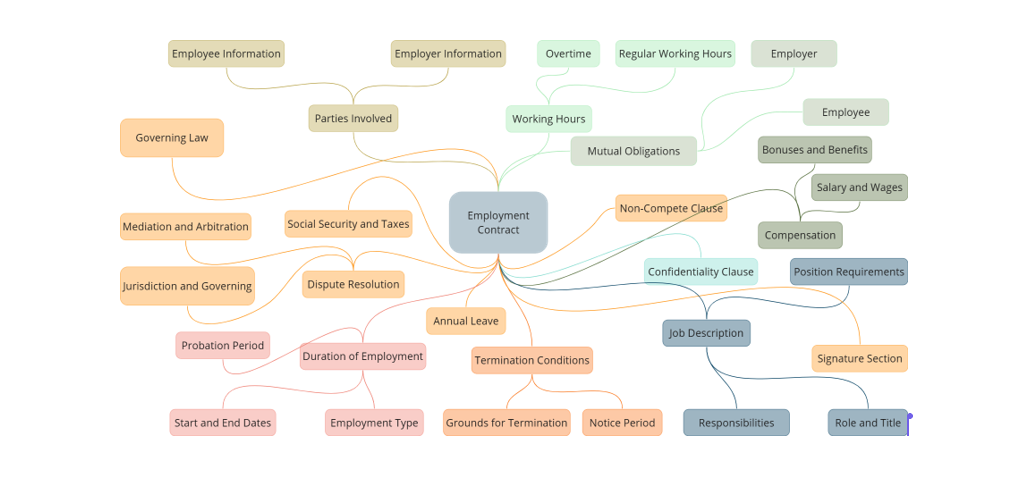16 Nisan 2024
Core Elements of Employment Contracts: The Basis of Employment Relationships in Türkiye

Employment contracts in Türkiye are governed not only by the Labor Law but are also influenced by various other legislative frameworks. This comprehensive approach ensures robustness and thoroughness in employment legalities, safeguarding both employer and employee interests.
Introduction
Employment contracts in Türkiye are governed not only by the Labor Law but are also influenced by various other legislative frameworks. This comprehensive approach ensures robustness and thoroughness in employment legalities, safeguarding both employer and employee interests.
Comprehensive Integration with Other Legislative Frameworks
The employment contract is a multifaceted legal document that intersects with several key areas of Turkish law:
Turkish Code of Obligations: As defined in Article 393 of the Turkish Code of Obligations (TCO), a service contract closely resembles an employment contract where an employee agrees to perform work under dependence for a specific or unspecified period, while the employer agrees to compensate either based on time or the work performed. This reinforces and aligns with the stipulations found in the Labor Law.
Occupational Health and Safety: National laws concerning occupational health and safety are crucial for ensuring a safe working environment. These regulations must be integrated into employment agreements to promote safety and health at work.
Social Security Law: Employment contracts must consider the provisions of the Social Security Law, which governs employee benefits and protections, ensuring that all statutory requirements for social security are met.
International Agreements: Compliance with international labor agreements, to which Türkiye is a party, sets standards that influence local employment conditions and practices, aligning them with global norms.
Sector-Specific Regulations: Certain sectors like "offshore shipping" and "fishing" have specific requirements that must be addressed in employment contracts to cater to the unique aspects and risks associated with these fields.
Environmental Legislation: Employers must also consider environmental legislation relevant to their operations, ensuring that employment practices do not contravene ecological standards.
Core Elements of the Employment Contract
Employment contracts in Türkiye rest on three foundational elements:
Data Privacy and Security in Employment Contracts
As the digital workplace evolves, the importance of robust privacy and security measures within employment contracts cannot be underestimated. Such contracts often encompass provisions for non-disclosure agreements (NDAs) and confidentiality clauses to protect sensitive company information and trade secrets. Ensuring compliance with privacy laws is crucial for maintaining the integrity of both employer and employee data.
In Türkiye, the Personal Data Protection Law (KVKK), along with the General Data Protection Regulation (GDPR) in Europe, sets stringent guidelines for handling personal data, emphasizing the need for explicit consent and protective measures for data processing.
For example, the processing of biometric data, such as fingerprints or facial recognition for access control and time attendance, introduces additional complexities. These practices must align with legal standards to ensure the security of such sensitive information, underscoring the need for careful contract management and compliance strategies.
Core Elements of Employment Contracts: A Visual Guide

Conclusion
Understanding the interconnections between the Labor Law, Turkish Code of Obligations, and other relevant laws provides a comprehensive backdrop for crafting and executing employment contracts in Türkiye. Awareness of these linkages is crucial for navigating the complexities of employment relations effectively, ensuring that businesses and employees are well-equipped to comply with both national and international standards.
In today's complex regulatory environment, designing employment contracts that are both protective and compliant is crucial for mitigating legal risks.
Navigating the complexities of employment law requires a keen understanding of both regulatory requirements and the unique needs of your organization. At CottGroup, our Labor Law Consulting services are designed to ensure that your employment contracts are not only legally compliant but also tailored to protect your organization against a wide range of legal risks.
Our team of experts specializes in creating employment agreements that support a proactive approach to legal compliance and risk management. By partnering with us, you can ensure that your employment practices are robust and designed to uphold the integrity of your workplace. For more information on how we can assist you in crafting Protective and Compliant Employment Contract Designs, we invite you to explore our services and learn more about our approach to safeguarding your business interests.
Notification!




